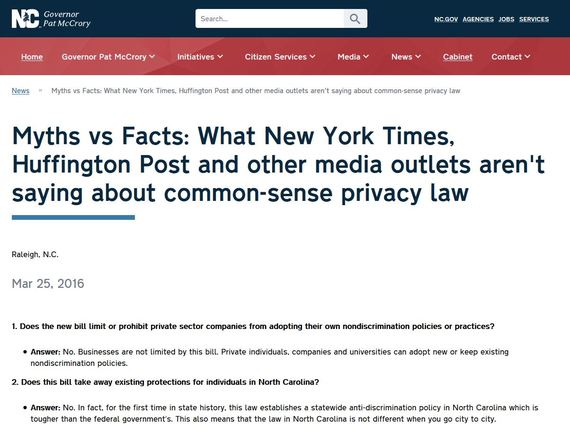The North Carolina legislature recently passed legislation partially restoring state-law employment discrimination claims eliminated by House Bill 2. Here is what the partial "fix" restores and what it cuts back. The partial "fix" did not address other matters in House Bill 2 that I previously covered in McCrory's House Bill 2: A Brief Outline of Its Five "Parts." It thus does nothing to address moral and other issues raised by those parts.
1. The "Fix"
The text of the partial "fix" itself can be found here and has two parts. First, it partially restores workers' rights to sue in state court for certain types of employment discrimination. It does this by deleting the following carefully-crafted language from House Bill 2: "This Article does not create, and shall not be construed to create or support, a statutory or common law private right of action, and no person may bring any civil action based upon the public policy expressed herein." I quote this carefully-crafted language (which I'll call the "Limiting Language") to call out House Speaker Tim Moore who recently remarked: "As we said from the beginning, there was never an intent to limit the right of anybody to seek redress in state court." Of course, unless the Limiting Language somehow magically inserted itself into House Bill 2, Moore's statement can't be true.
The remedies restored by the fix are only partially restored for two reasons. First, the "fix" expressly cuts back workers' rights with a new one-year statute of limitations cutting back the previous three-year limitations period. Whacking the statute of limitations by two-thirds is a major blow to workers since many discriminatory acts can easily take more than one year to discover. For example, if your employer gives everyone but you a big bonus one year but excludes you because you're a Baptist or because you're of a race the employer doesn't like, one year is precious little time if you have no idea what other workers received and those workers don't talk about compensation or bonuses. A three-year statute of limitations was already quite short. Why are we making it even shorter in a "fix"? And, again, how can House Speaker Tim Moore say with a straight face "As we said from the beginning, there was never an intent to limit the right of anybody to seek redress in state court" when his very "fix" itself does just that? And why was the problem created in a bathroom bill in the first place?
Second, the "fix" is partial because if you have a sex discrimination claim, you must now bring a "biological sex" discrimination claim instead. The old claim no longer exists since public policy now prohibits "biological sex" discrimination rather than "sex" discrimination. "Biological sex" discrimination means discrimination on account of "[t]he physical condition of being male or female, which is stated on a person's birth certificate." Since birth certificates are now involved in the definition of discrimination claims, does this mean there can only be a claim where a birth certificate exists AND the gender is correctly listed? Or does it mean there is no claim unless the employer has also somehow considered a birth certificate when discriminating? Or does it mean all this or perhaps something else entirely? Who knows at this point. If we really want to protect women (as the hype around House Bill 2 maintained), why would we want to make it harder or more confusing for them to bring sex discrimination claims? And again what about Speaker Moore's statement: "As we said from the beginning, there was never an intent to limit the right of anybody to seek redress in state court"?
2. Beware of the Misinformation
House Speaker Tim Moore and Gov. Pat McCrory may try to respond that they did the best they could with House Bill 2 given the "looming" Charlotte ordinance and that they did the best they could with the "fix" given the previous passage of House Bill 2. However, neither such defense would fit Moore's statement and the facts. Again, Speaker Moore claims: "As we said from the beginning, there was never an intent to limit the right of anybody to seek redress in state court." If this is so, then there is of course no excuse for the "fix" to limit rights. If no one wants to limit rights then why were they limited in the "fix" as well?
If Moore speaks the truth, then there was also no excuse for House Bill 2 to limit rights. Even if one assumes the Charlotte ordinance presented a pending calamity and even if one assumes a phrase as complex and carefully crafted as the Limiting Language could somehow spontaneously appear in a draft of House Bill 2, there was plenty of time to remove that magically-appearing language. Speaker Moore and crowd rushed through House Bill 2 in one day on March 23, 2016. However, the Charlotte Ordinance would not have gone into effect until April 1, 2016. There was thus well over a week to find and remove the Limiting Language that had "magically" appeared in the bill. That included well over a week in which McCrory could have exercised his veto to eliminate provisions he claims he did not endorse. (The Charlotte ordinance with its April 1 effective date can be found here. It is also worth a read in itself to see if it really contains the parade of horribles we were told that it contains. Spoiler alert: it doesn't.)
Unfortunately, Speaker Moore has good reason to believe he won't be held accountable for obviously false statements like his "As we said from the beginning, there was never an intent to limit the right of anybody to seek redress in state court." Governor Pat McCrory continues to publish his whoppers, too. For example, here's a clip from his March 25, 2016 Press Release that remains online without any retraction despite the obvious untruths within the second answer:
As of the publication date of this article, the reader can find this misinformation still posted online. We have to change this climate where politicians feel free to misinform in such blatant ways. Moore's statement is particularly troubling since he says it even as he pushes through a shorter statute of limitations doing the very opposite of what he claims everyone wants to do.
Since religious conservatives seem particularly-strong backers of Moore and McCrory, I would ask such conservatives a few questions. How is it right to shorten your right to sue for religious discrimination when an employer has horribly discriminated against you? How is it right for political leaders like Moore and McCrory to tell untruths about the effects of what they have done? How is it right to go after workers again even in the "fix" purporting to help them? How is it right for Moore and McCrory to pretend they had to pass and sign House Bill 2 on March 23, 2016 when the Charlotte Ordinance was not set to go into effect until April 1, 2016? How is it right to put people like that back into office? Again, as of the last time I checked, McCrory's press release from March 25, 2016 remains online and uncorrected. How is it morally right to have someone who operates that way sit in the Executive Mansion in Raleigh?



